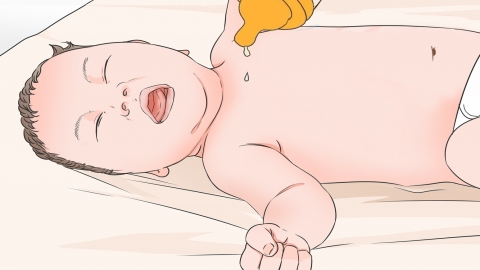What does it mean when a baby rolls their eyes upward?
Generally, the main causes of a baby rolling their eyes upward include incomplete nervous system development, special manifestations during the sleep cycle, febrile seizures, epilepsy, and congenital eye muscle abnormalities. If eye rolling is accompanied by altered consciousness or occurs frequently, it is recommended to seek timely medical attention at a reputable hospital. Detailed explanations are as follows:
1. Incomplete Nervous System Development
A baby's cerebral cortex may not be fully developed and thus has weaker control over the eye muscles, occasionally resulting in brief upward eye rolling, which is usually a normal physiological phenomenon. No special treatment is required; symptoms will gradually improve as the baby grows older. Regular observation is advised, and sharp objects should be kept away from the baby to prevent accidental injuries.

2. Special Manifestation of the Sleep Cycle
During sleep, babies experience a rapid eye movement (REM) phase, during which the eyes may move irregularly, including brief upward rolling, often accompanied by steady breathing. Keep the sleeping environment quiet and comfortable with soft lighting, and avoid sudden noises or bright light stimulation. No intervention is needed; symptoms will naturally subside after transitioning through the sleep cycle.
3. Febrile Seizures
When a baby's body temperature rises sharply above 38.5°C, abnormal neuronal discharges in the brain can trigger seizures, manifesting as upward eye rolling and limb twitching. Immediately use lukewarm water to wipe the forehead and armpits to reduce the temperature. Administer paracetamol suspension according to medical advice to reduce fever. During a seizure, place the baby on their side, clear oral secretions to avoid suffocation, and seek further medical evaluation if seizures recur frequently.
4. Epilepsy
Epileptic seizures are caused by abnormal brain discharges, which may result in repeated upward eye rolling, loss of consciousness, and limb stiffness. Under a doctor's guidance, medications such as sodium valproate oral solution, levetiracetam oral solution, and oxcarbazepine oral suspension can be used to control seizures. Regular electroencephalogram (EEG) follow-ups are necessary. Avoid letting the baby engage in activities alone to prevent injuries during seizures.
5. Congenital Eye Muscle Abnormalities
Imbalanced development of the extraocular muscles at birth can lead to uncoordinated eye movements, causing persistent upward eye rolling. Mild cases can improve with eye massage and visual training, while severe cases may require corrective surgery for the extraocular muscles. Postoperatively, follow medical advice to use tobramycin eye drops to prevent infection and regularly monitor the recovery of vision.
In daily life, closely observe the baby's mental state, regularly measure body temperature to avoid high fever, maintain eye hygiene, and avoid direct exposure to strong light. Regular pediatric health checkups are important to detect developmental abnormalities early and ensure the baby's healthy growth.







